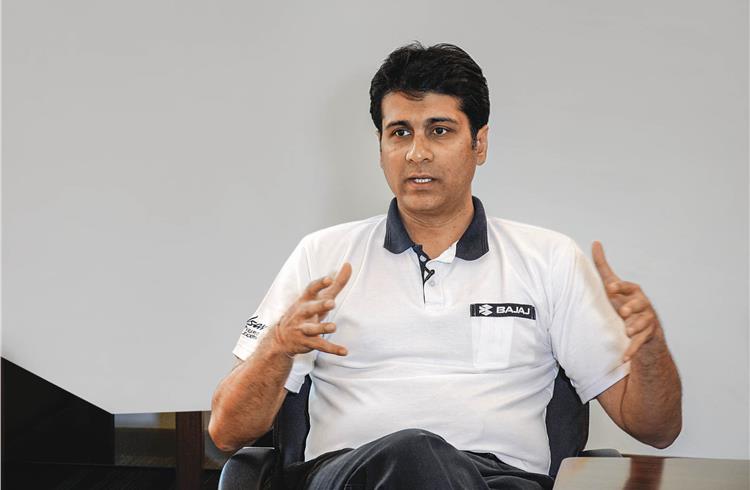Rajiv Bajaj calls 100% sales mandate for e-2Ws, 3Ws ‘impractical’
Bajaj Auto MD flays proposed mandate to electrify all 3Ws by 2023 and 2Ws by 2025. Points to industry’s inexperience in EV making, mandate too close to BS VI implementation, and need to include four-wheelers
Rajiv Bajaj: “An appropriate middle path would be, in the first phase, to target such a changeover through CAFÉ norms / EVs for all vehicle categories from 2023 or 2025, starting with the most polluted cities of India.”
The government of India’s ambitious move for mass vehicle electrification in the country, which has seen industry bodies SIAM and CII call for a rethink and a phased programme after consultation with industry stakeholders, now gets a hard-hitting comment from Rajiv Bajaj, managing director of Bajaj Auto.
As is known, the government of India’s EV programme, which aims to have a large portion of the country’s vehicle parc powered by lithium-ion batteries by 2030, is looking to make an impact and gain traction in the market by focusing on and starting with what are recognised as the low-hanging fruit – two- and three-wheelers.
On June 4, Autocar Professional had reported that in a recent meeting of the Inter-Ministerial Steering Committee of the National Mission for Transformative Mobility and Battery Storage, the high-level panel is looking to mandate sales of only electric three-wheelers from April 1, 2023 and April 1, 2025 for electric two-wheelers (below 150cc).
Commenting on the reported initiative of the government of India mandating 100 percent EVs for sale of three-wheelers by 2023 and two-wheelers by 2025, Rajiv Bajaj says, “I completely agree with the spirit of this initiative in that India must demonstrate a pioneer rather than laggard mindset. However, I have three execution-related concerns.
“First that it may be impractical to target such a scale when none of the stakeholders currently possess any meaningful experience with any of the pieces of the EV puzzle. Secondly that it is ill-timed to target a date so close to BS VI implementation. And finally, to target two- and three-wheelers but not cars etc makes it an incomplete initiative.
“An appropriate middle path to my mind would be in the first phase to target such a changeover through Corporate Average Fuel Efficiency (CAFÉ) norms / electric vehicles for all vehicle categories from a particular date such as 2023 or 2025, starting with the most polluted cities of India. Basis the learnings from that experience, a collective plan can be put together to scale up as desired.”
“An appropriate middle path to my mind would be in the first phase to target such a changeover through Corporate Average Fuel Efficiency (CAFÉ) norms / electric vehicles for all vehicle categories from a particular date such as 2023 or 2025, starting with the most polluted cities of India. Basis the learnings from that experience, a collective plan can be put together to scale up as desired.”
Also read: Venu-srinivasan “unrealistic deadline for mass adoption of e2ws 3ws risks derailing industry
CII joins SIAM in urging Centre for consultation before finalising EV timelines
RELATED ARTICLES
Bosch hydrogen engine tech-powered truck to be on Indian roads this year
The global supplier of technology and services is betting big on both electromobility and hydrogen. While announcing the...
IIT Bombay inaugurates Arun Firodia Research Floor
IIT Bombay, one of India’s top technical and research institutions, honours Kinetic Group chairman Dr Arun Firodia, one ...
Maruti Suzuki expands capacity at Manesar plant by additional 100,000 units
New assembly line at Plant A expands total manufacturing capacity at the Manesar plants to 900,000 units per annum. Alon...





 By Autocar Pro News Desk
By Autocar Pro News Desk
 10 Jun 2019
10 Jun 2019
 10242 Views
10242 Views









